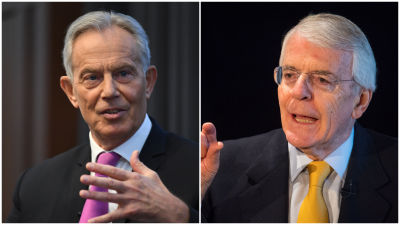Tony Blair and Sir John Major unite as Boris Johnson's Brexit plan faces widespread criticism

Boris Johnson is facing mounting criticism over his legislation overriding his Brexit deal, as leaders from across the political spectrum attacked the threat to break international law.
Former prime ministers Sir John Major and Tony Blair united to urge MPs to reject the legislation, saying it imperils the Irish peace process, trade negotiations and the UK’s integrity.
Senior Conservatives were not backing down on their rebellion against the prime minister’s plans despite his warning that Brussels could “carve up our country” without his new Bill.
Mr Johnson has faced fierce criticism after turning against a deal he championed just months ago - hailing it as "oven-ready" ahead of the General Election.
Irish Foreign Minister Simon Coveney said the UK's reputation as a trusted negotiating partner is "being damaged" by the government's plan.
In an article for the Sunday Times, the former prime ministers wrote: “We both opposed Brexit. We both accept it is now happening.
"But this way of negotiating, with reason cast aside in pursuit of ideology and cavalier bombast posing as serious diplomacy, is irresponsible, wrong in principle and dangerous in practice"
They added: “It raises questions that go far beyond the impact on Ireland, the peace process and negotiations for a trade deal — crucial though they are.
"It questions the very integrity of our nation.”
Justice Secretary Robert Buckland admitted to the BBC's Andrew Marr there was a "conflict" between the proposed UK law and international law but said the new bill was an "insurance policy".
ITV News Political Correspondent Romilly Weeks breaks down the situation from Westminster
He said it was up to the British government to resolve the issues as quickly as possible.
Mr Buckland said he would only resign “if I see the law being broken in a way I find unacceptable I will of course go".
Speaking to the BBC's Andrew Marr, Mr Coveney said the plans represent a “serious risk” to the peace process amid acrimony in the negotiations with the EU.
He said no-deal would be a "failure of politics" but insisted it is possible to get an agreement but cautioned "it will probably be a basic pretty thin agreement.”
Sir Keir Starmer meanwhile accused Mr Johnson of having “reigniting old rows” by working to flout his own Withdrawal Agreement, but pledged Labour support if he addresses “substantial” concerns.
Tory rebels suggested their numbers were growing and opinions were only hardened by Mr Johnson’s increased rhetoric that the EU could impose a trade border in the Irish Sea.
Sir Keir called on Mr Johnson to throw out clauses that could breach international law and those that lead the devolved administrations to warn of a “power grab” to get Labour support.
“If the Government fixes the substantial cross-party concerns that have been raised about the Internal Market Bill, then we are prepared to back it,” Sir Keir wrote in the Sunday Telegraph.
“But if they do not, and the talks collapse, then it is their failure and incompetence that will have let the British people down.”
The newspaper also reported that ministers are considering opt-outs from the Human Rights Act, and that a formal review could be announced in the coming weeks.
The Tory manifesto pledged to “update” the Act after Brexit, but the move is contentious with Brussels and negotiators have expressed concern over the UK’s commitment to the European Convention on Human Rights.
Mr Buckland insisted the bill is in accordance with “the most honourable traditions of the British state”.
Mr Buckland twice dodged the question when asked if he would resign if the Government does not abide by the rule of law Sky’s Sophy Ridge On Sunday.
He said: “It’s not a question about me or my position, the whole Government is actually committed to the rule of law.
“I can assure that what we’re doing is in accordance with what I think actually the most honourable traditions of the British state which is to alert everyone to a possibility of a problem, to actually legislate to prepare ourselves domestically for that."
He added Mr Johnson “absolutely” does want to broker a free trade deal with the EU.
Despite Mr Johnson’s attempts to drum up support, Tory chairman of the Commons defence committee Tobias Ellwood said on Saturday that he could not support the legislation without it being changed.
“Already this Bill is damaging brand UK, diminishing our role-model status as defender of global standards. As we go to the wire, let’s see more British statecraft – less Nixonian Madman Theory,” he tweeted.
Commons justice committee chairman Sir Bob Neill, who has tabled an amendment that he said would impose a “parliamentary lock” on any changes to the Withdrawal Agreement, said he still contends it contains “objectionable” elements.
Damian Green, who was Theresa May’s deputy when she was prime minister and is backing the amendment, was also understood to not have been won over by Mr Johnson’s argument.
Sir Roger Gale also remained a vehement critic, telling Times Radio: “If anybody is responsible, if it happens, for bringing the union down, it will be (chief aide Dominic) Cummings and Mr Johnson.”